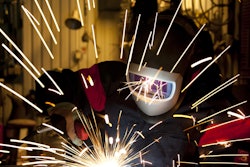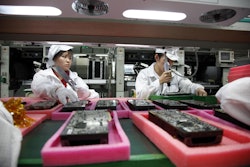Manufacturing is currently going through a period of dramatic transformation.
This change is driven by the onset of the smart factory, as manufacturers increasingly connect their products to analytics, artificial intelligence, and IoT to drive business value. The smart factory today has huge potential to help manufacturing businesses overcome impending market volatilities and business challenges while also improving production processes and output.
But what if you have all this innovation but your workforce is not engaged? This could be a problem, especially since workforce-related issues consistently rank at the top of manufacturers’ list of operational concerns. For example, in a recent survey, respondents cited “finding enough people with the right skills and talent” as the second-highest concern. “Increasing labor productivity” was right behind it, at number three. (“The Future of Manufacturing: 2020 and Beyond,” IW Custom Research sponsored by Kronos Incorporated, 2016.)
The concerns are justified. The entire industry is facing a growing skills gap as baby boomers begin to retire and the next generations of potential workers seem to be less interested in manufacturing careers. Also, with increased automation, artificial intelligence, and machine learning continuing to shape smart factories, managers need to make sure their workforce is up-to-speed with the right technical skills while, also ensuring that they feel valued and are treated fairly.
The Case For An “Engaged” Workforce
Clearly, the future of manufacturing relies on next-generation technologies, but next generation, transformational solutions are also needed to shape the future of how workforces are managed. After all, an improved employee experience leads to higher levels of engagement and better business outcomes.
So why should manufacturers consider next-generation workforce management technology as part of their smart factory strategy? Simple. They need to invest in the employee experience by giving them the right tools and methodologies — and empower them to make changes that can drive innovation and business results.
Powerful Solutions, Powerful Results
More specifically, next-generation workforce management technologies now enable the entire workforce to work the way they prefer and work much smarter. In the following sections, we’ll take a closer look at two examples that show how these new advancements in workforce management can help manufacturers focus on the workforce and achieve their vision of the future.
“Work Your Way”: Improve The Work Experience For All Employees
New innovations in workforce management technology deliver applications that can operate entirely on a user’s preferred mobile device. The mobile-first, device agnostic way delivers new advantages for both employees and managers:
- For employees, this newfound mobility now gives them greater visibility and control over their entire work experience. This is especially valued in areas such as scheduling, where employees generally wish for more work-life balance; now they can have a say in their schedules.
How?
For example, if something comes up unexpectedly — a change in a child’s sports schedule or the need to care for a sick relative — the employee can use her mobile device to quickly post her shift to a shift-trade board. The shift remains filled and the employee walks away much happier and engaged, and work isn’t compromised.
- For managers, these mobile solutions free them so they can be productive anywhere, anytime. They will no longer be trapped behind a desk or tied to a back office. Instead, they can manage directly on the shop floor and interact directly with employees on the line.
The workforce management solutions are completely device-agnostic, so users can easily move from desktop to tablet to phone — with the identical experience and without feature loss.
Additionally, for both employees and managers, one-click actions offer new improvements over traditional workflow and processes such as calling out sick, submitting time-off requests, reviewing timecards, swapping shifts, building schedules, and so much more.
“Work Smarter”: Empower Managers To More Effectively Manage And Engage Their People
These next-generation workforce management solutions now include powerful machine-learning solutions that can detect meaningful patterns within mountains of data to learn from various behaviors and make highly relevant recommendations for people managers.
For example, machine learning’s predictive capabilities can provide specific guidance to automate routine workforce management decisions, such as whether (or not) a time-off request should be approved. These recommendations factor in variables including: if there is enough coverage in the schedule, if the employee has the necessary time-off balances, and many others. Now, with guided decisions made through machine learning, managers can rely on quick, accurate approval decisions and spend extra time connecting with their employees.
Additionally, powerful embedded analytics can now provide real-time key performance indicators (KPIs), which help make managers’ jobs easier by delivering relevant metrics such as workforce productivity, overtime, and other information. KPIs can be tailored to meet the organization’s specific needs, and managers can easily set KPI targets and thresholds to monitor performance with the help of highly visual dashboards and interactive reporting.
These analytics, capable of delivering the context, awareness, and analysis of key decisions — and doing so in the moment they must be made — are key to improving employee performance, efficiency, and overall productivity.
Today’s manufacturing workforce needs empowerment, flexibility, and appreciation, but tomorrow’s workforce will expect it. In fact, manufacturers will be better served by transforming the employee experience, starting right now.
Manufacturers who help employees stay connected with business goals by providing them with a greater sense of purpose for their work and appreciation, while taking into account the tools and technologies that further drive their engagement and productivity, will ultimately succeed in the smart factory age.
Kylene Zenk is Director of the Manufacturing Practice Group at Kronos Incorporated






















